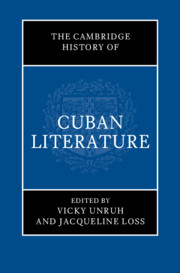Book contents
- The Cambridge History of Cuban Literature
- The Cambridge History of Cuban Literature
- Copyright page
- Dedication
- Contents
- Figures
- Contributors
- Acknowledgments
- Introduction Unfinished Histories
- Part I Literature in the Early Colony
- Part II Cuban Literature’s Long Nineteenth Century
- 3 Alexander von Humboldt and the Cultural Invention of Cuba Among Its Nineteenth-Century Intellectual Elite
- 4 Philosophy and Pedagogy in Félix Varela, José de la Luz y Caballero, and Enrique José Varona
- 5 Mercedes Merlin and the Rhetoric of Life Writing, Exile, and Race
- 6 The Lyric Vernacular of Cuban Romanticism
- 7 Gertrudis Gómez de Avellaneda as Literary Precursor and Transatlantic Intellectual
- 8 Racialized Futures
- 9 Journalism and Nineteenth-Century Literary Culture
- 10 José Martí as Hemispheric Visionary
- 11 Julián del Casal and the Other Faces of Cuban Modernismo
- 12 Performance Worlds of Nineteenth-Century Cuban Theater
- Part III Literary and Intellectual Culture in the Twentieth-Century Republic
- Part IV The Revolution’s Literary-Cultural Initiatives and Their Early Discontents
- Part V Cuba and Its Diasporas into the New Millennium
- Epilogue
- Select Bibliography
- Index
- References
8 - Racialized Futures
Slavery, Miscegenation, and Speculative Literature
from Part II - Cuban Literature’s Long Nineteenth Century
Published online by Cambridge University Press: 31 August 2024
- The Cambridge History of Cuban Literature
- The Cambridge History of Cuban Literature
- Copyright page
- Dedication
- Contents
- Figures
- Contributors
- Acknowledgments
- Introduction Unfinished Histories
- Part I Literature in the Early Colony
- Part II Cuban Literature’s Long Nineteenth Century
- 3 Alexander von Humboldt and the Cultural Invention of Cuba Among Its Nineteenth-Century Intellectual Elite
- 4 Philosophy and Pedagogy in Félix Varela, José de la Luz y Caballero, and Enrique José Varona
- 5 Mercedes Merlin and the Rhetoric of Life Writing, Exile, and Race
- 6 The Lyric Vernacular of Cuban Romanticism
- 7 Gertrudis Gómez de Avellaneda as Literary Precursor and Transatlantic Intellectual
- 8 Racialized Futures
- 9 Journalism and Nineteenth-Century Literary Culture
- 10 José Martí as Hemispheric Visionary
- 11 Julián del Casal and the Other Faces of Cuban Modernismo
- 12 Performance Worlds of Nineteenth-Century Cuban Theater
- Part III Literary and Intellectual Culture in the Twentieth-Century Republic
- Part IV The Revolution’s Literary-Cultural Initiatives and Their Early Discontents
- Part V Cuba and Its Diasporas into the New Millennium
- Epilogue
- Select Bibliography
- Index
- References
Summary
This chapter examines Cuban fiction about slavery emerging in the 1830s–1840s: Petrona y Rosalía (1838) by Félix Tanco y Bosmeniel; Francisco, el ingenio o las delicias del campo (1838–1839) by Anselmo Suárez y Romero; the short story “Cecilia Valdés” (1839) by Cirilo Villaverde (1812–1894), who later developed it into the novel Cecilia Valdés o La Loma del Ángel (1882); Autobiografía de un esclavo (1840) by Juan Francisco Manzano; and Sab (1841) by Gertrudis Gómez de Avellaneda. The chapter contextualizes the analysis in tensions between the demands for labor and “ad hoc moral alibis” characterizing Plantation America, particularly the improvised concepts of racial differentiation – Blackness and Black-and-white miscegenation – typifying responses to these tensions. The analysis of this literature as speculative writing that looks simultaneously toward the past and future links it to the sometimes improvisational and speculative nature of the new plantation-based societies, which were themselves entangled between speculative finance capital and moral reflections on freedom, and to the intensified anxieties about Cuba’s racialized future generated by the 1841 demographic census.
Keywords
- Type
- Chapter
- Information
- The Cambridge History of Cuban Literature , pp. 142 - 156Publisher: Cambridge University PressPrint publication year: 2024

